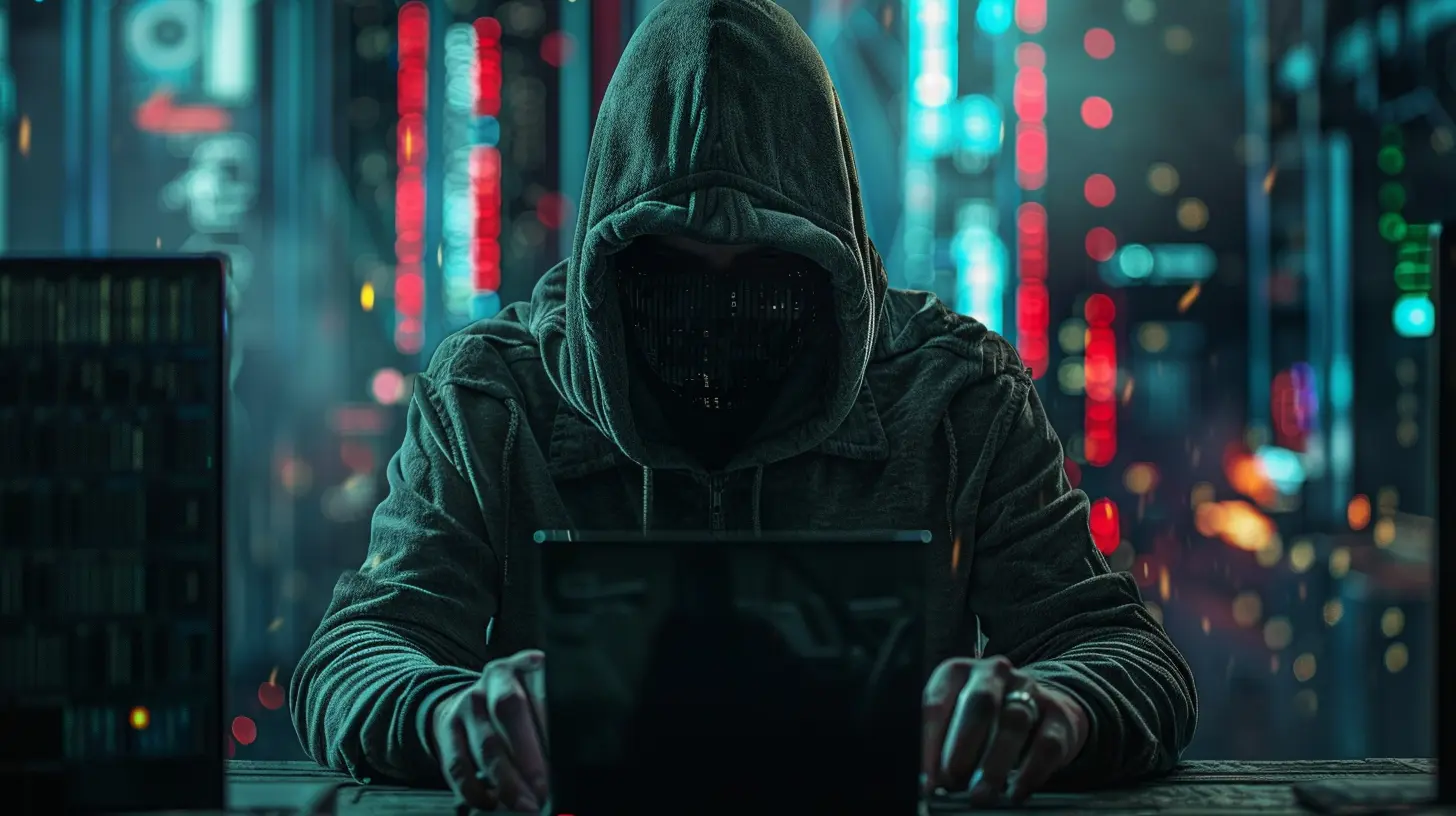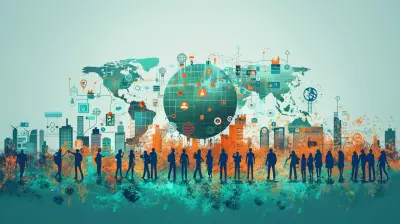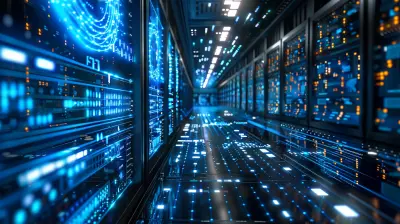The Growing Danger of Cyber Weaponization in Global Conflicts
7 March 2025
In today's world, where technology is advancing at lightning speed, global conflicts are no longer limited to traditional battlefields. Instead of tanks and guns, we now face a new kind of warfare—one fought with lines of code, malicious software, and sophisticated cyber tactics. The growing danger of cyber weaponization is a reality we can’t ignore, especially as it increasingly plays a pivotal role in international disputes and conflicts.
But what exactly does "cyber weaponization" mean? How big is the threat, and why should we care? Let’s dive in and explore this rising danger that has the potential to change the face of global conflicts forever.

What Is Cyber Weaponization?
Cyber weaponization refers to the use of digital tools, malware, and software vulnerabilities as weapons in the context of conflict. Unlike conventional weapons, cyber weapons are designed to infiltrate, disrupt, or destroy digital systems, often without the victim even realizing they've been attacked. It’s like a modern-day Trojan horse, sneaking into critical systems and causing chaos from within.These cyber weapons can be crafted to:
- Steal sensitive information
- Shut down infrastructure like power grids or financial systems
- Manipulate or destroy data
- Spread disinformation
- Paralyze government operations or military communication
In other words, cyber weaponization is about using technology to achieve military or political objectives—without ever firing a single bullet.

Why Is It So Dangerous?
At first glance, a cyber weapon might not seem as threatening as a missile or a bomb, but this perception is misleading. In many ways, cyber weapons can be even more dangerous, mainly because of their stealth and the magnitude of the damage they can cause.Imagine an attack that shuts down an entire country's power grid. Hospitals, banks, airports, and government offices would grind to a halt. Or consider a scenario where hackers infiltrate military communication channels, causing confusion during critical operations. The potential for destruction is massive, and the consequences can ripple across borders.
Another crucial factor is how hard it is to pinpoint the attacker. In a traditional war, you can see where the bullets are coming from. In cyber warfare, attackers can hide behind layers of anonymity, making it challenging to respond or even know who to blame.

How Cyber Weapons Are Being Used in Global Conflicts
Cyber weaponization isn’t a far-off, futuristic concept. It’s happening right now, and governments and organizations worldwide have already experienced its devastating effects.1. State-Sponsored Attacks
Several nations are actively developing and deploying cyber weapons as part of their military strategy. Countries like the United States, Russia, China, and North Korea have been accused of engaging in cyber warfare to advance their political or military agendas.For example, in 2010, the infamous Stuxnet worm targeted Iran’s nuclear facilities. It was a sophisticated piece of malware that caused irreversible damage to the country’s nuclear centrifuges. This marked the first-known instance of a cyber weapon being used to physically destroy equipment. While it was widely speculated that the attack was state-sponsored, no country openly admitted responsibility.
Similarly, in 2017, the WannaCry ransomware attack wreaked havoc across the globe. While North Korea was accused of orchestrating the attack, it affected over 300,000 computers in more than 150 countries, including hospitals, businesses, and government agencies. The attack demonstrated just how interconnected and vulnerable our systems are.
2. Espionage and Data Theft
In many cases, cyber weapons are used to steal information rather than cause direct destruction. This kind of cyber espionage can be just as harmful. Leaked military plans, stolen blueprints of critical infrastructure, or hacked government emails can provide adversaries with a significant advantage.One notable example is the 2016 hack of the Democratic National Committee (DNC) during the U.S. presidential election. Allegedly backed by Russian operatives, the attack led to the release of thousands of sensitive emails, which some analysts believe influenced the election’s outcome.
3. Critical Infrastructure Attacks
Perhaps the most unsettling danger of cyber weaponization is the potential to target critical infrastructure. Power grids, water supply systems, transportation networks, and communication systems are all vulnerable to cyberattacks.In December 2015, Ukraine experienced a massive power outage that left hundreds of thousands of people in the dark for hours. It was later revealed that the blackout was the result of a well-coordinated cyberattack, allegedly carried out by Russian hackers. This incident served as a stark reminder of how dependent modern society is on digital systems—and how easily they can be compromised.
4. Disinformation and Psychological Warfare
Cyber weapons aren't just about hacking into systems; they’re also about manipulating information. Disinformation campaigns, spread through social media and fake news websites, are becoming a powerful tool in global conflicts. These campaigns aim to sow discord, create confusion, and undermine trust in institutions.For example, during the 2016 U.S. election and the Brexit referendum, foreign actors allegedly used social media platforms to spread disinformation and influence public opinion. While this form of cyber warfare doesn't involve physical damage, the long-term effects on social cohesion and political stability can be profound.

The Challenges in Defending Against Cyber Weaponization
If you think defending against cyberattacks is as simple as installing antivirus software, think again. The nature of cyber warfare makes it incredibly challenging to protect against these digital assaults for several reasons.1. Anonymity of Attackers
One of the most significant challenges is the anonymity of cyber attackers. It’s tough to determine who is behind an attack, as hackers can easily cover their tracks. Without knowing the source, it’s difficult to retaliate or even prepare defenses against future attacks.2. Constantly Evolving Threats
Cyber weapons are constantly evolving. New vulnerabilities are discovered every day, and hackers are quick to exploit them. Unlike traditional weapons, which may take years to develop, a cyber weapon can be created, deployed, and rendered obsolete in a matter of weeks or months. This makes it incredibly hard for defenders to keep up.3. Global Nature of Cyberspace
Cyberspace knows no borders. An attack launched from one country can easily affect another halfway across the globe. This interconnectedness means that a cyberattack on one nation’s infrastructure can have cascading effects on others, making global coordination and cooperation essential—but also difficult to achieve.4. Limited Legal Frameworks
There are currently very few international laws governing cyber warfare. While there are treaties and conventions for conventional warfare (like the Geneva Conventions), the rules for cyber warfare are still murky. This legal gray area makes it easier for attackers to operate without fear of significant repercussions.What Can Be Done?
So, how can we protect ourselves from the growing danger of cyber weaponization? While there's no silver bullet, a combination of strategies could help mitigate the risks:1. International Cooperation
Countries need to work together to create global norms and agreements that govern the use of cyber weapons. Similar to how nuclear weapons are regulated, there should be a framework for what is and isn’t acceptable in cyberspace. Additionally, nations must share intelligence and collaborate in tracking and stopping cyber attackers.2. Strengthening Cybersecurity
Governments, businesses, and individuals must invest in stronger cybersecurity measures. This includes regularly updating software, using encryption, and educating employees about phishing and other common cyber threats. While these steps won’t eliminate the risk, they can make it much harder for attackers to succeed.3. Developing Cyber Deterrence
Just as countries maintain nuclear deterrents, they may need to develop cyber deterrents. This could involve making it clear that any cyberattack on critical infrastructure will be met with a proportional response, whether in cyberspace or through traditional military means. Deterrence is about showing potential attackers that the cost of their actions will outweigh any potential gains.4. Public Awareness and Education
The general public also plays a role in defending against cyber weaponization. Disinformation campaigns, for instance, thrive on ignorance. By improving digital literacy and encouraging critical thinking, we can make it harder for adversaries to manipulate public opinion or sow discord.
Conclusion
The growing danger of cyber weaponization in global conflicts is real, and it’s evolving fast. As nations continue to develop more sophisticated cyber weapons, the lines between peace and war become increasingly blurred. While traditional warfare is still a threat, the digital battlefield is quickly becoming the new frontier in global conflicts.The question is not whether cyberattacks will continue, but how prepared we are to face them. As technology advances, so too must our defenses. It’s time for nations, businesses, and individuals to recognize the seriousness of this threat and take action before it’s too late.
all images in this post were generated using AI tools
Category:
Cyber ThreatsAuthor:

John Peterson
Discussion
rate this article
16 comments
Nolan Bowman
Cyber weapons: because launching a missile is so last season. Let's keep it virtual, folks!
April 7, 2025 at 10:35 AM

John Peterson
While cyber weapons may seem modern, they pose significant risks and consequences, often with real-world impacts that can't be underestimated. Virtual threats can escalate quickly into tangible conflicts.
Kendall Thomas
This article sheds light on a critical issue that affects us all. As cyber weaponization escalates, it's essential to prioritize dialogue and cooperative solutions to safeguard our digital landscape and prevent further harm. Together, we can foster a more secure future.
April 7, 2025 at 5:00 AM

John Peterson
Thank you for your insightful comment! I completely agree—collaboration and open dialogue are vital in addressing the threats posed by cyber weaponization.
Vesperos Sweeney
This article effectively highlights the urgent need to address the threat of cyber weaponization in global conflicts. Balancing innovation with security measures is crucial to safeguard nations and citizens from emerging cyber threats.
April 5, 2025 at 8:38 PM

John Peterson
Thank you for your thoughtful comment! I completely agree that balancing innovation and security is essential in addressing the challenges posed by cyber weaponization.
Isabelle Rivera
Cyber weaponization? More like the new world's sneaky ninja tactic! While nations are busy playing digital chess, let’s hope they remember that with great power comes great responsibility—and a serious need for better cybersecurity hygiene. Game on!
April 3, 2025 at 8:41 PM

John Peterson
Thanks for your insights! You're absolutely right—balancing power with responsibility is crucial as cyber tactics evolve. Enhanced cybersecurity is a must in this new arena.
Zephyra McPhee
This article sheds light on an increasingly critical issue. It's alarming how cyber weaponization can escalate conflicts with far-reaching consequences. Thank you for highlighting the need for awareness and dialogue in addressing this complex challenge.
April 2, 2025 at 1:02 PM

John Peterson
Thank you for your insightful comment! I appreciate your recognition of the need for awareness and dialogue on this critical issue.
Elle McGillivray
Great insights! As cyber threats evolve, it’s crucial for nations to prioritize cybersecurity and collaboration. Awareness and preparedness will be key in navigating this complex digital battleground. Keep sharing!
March 30, 2025 at 3:34 AM

John Peterson
Thank you! I appreciate your perspective on the importance of cybersecurity and collaboration in addressing evolving cyber threats.
Nora Sanchez
This article sheds light on a critical issue: the increasing use of cyber weapons in global conflicts. As nations turn to digital warfare, it's vital for businesses and individuals to enhance their cybersecurity measures. Staying informed and proactive is key to mitigating risks in this evolving threat landscape.
March 28, 2025 at 8:47 PM

John Peterson
Thank you for your insightful comment! You're absolutely right—enhancing cybersecurity is essential as cyber threats continue to grow in complexity and frequency. Staying informed is crucial for everyone.
Sophie Reyes
As nations increasingly turn to cyber warfare, we must question: are digital battlegrounds the future of conflict or a profound moral crisis?
March 26, 2025 at 11:35 AM

John Peterson
Digital battlegrounds are indeed shaping the future of conflict, but they also raise critical ethical concerns that we must address to prevent a moral crisis in warfare.
Callista Middleton
Cyber weaponization isn’t just a threat; it's a stark reality. Nations must wake up and take decisive action—ignoring this danger is not an option anymore.
March 26, 2025 at 3:57 AM

John Peterson
Thank you for your insightful comment! I completely agree that the urgency for nations to address cyber weaponization cannot be overstated; proactive measures are essential to mitigate this escalating threat.
Xavi Hodge
Cyber weaponization highlights the need for robust international norms and collective cybersecurity efforts.
March 25, 2025 at 1:54 PM

John Peterson
Absolutely, establishing international norms and fostering collective cybersecurity collaboration are crucial to mitigating the risks posed by cyber weaponization in global conflicts.
Nathan Maddox
Stay vigilant: Cybersecurity is essential now.
March 25, 2025 at 4:13 AM

John Peterson
Absolutely, vigilance is key. As cyber threats evolve, so must our defenses. Thank you for emphasizing this crucial point!
Valeris Kline
This article highlights a critical issue that affects us all. As technology advances, so do the threats. It's essential we approach these challenges with empathy and collective action, fostering dialogue and collaboration to ensure a safer digital landscape for everyone.
March 23, 2025 at 7:22 PM

John Peterson
Thank you for your insightful comment! I completely agree that empathy and collaboration are vital in addressing the challenges posed by cyber weaponization. Together, we can work towards a safer digital future.
Rook Sheppard
This article effectively highlights the rising risks of cyber weaponization, emphasizing the necessity for global cooperation and ethical standards.
March 22, 2025 at 7:19 PM

John Peterson
Thank you for your insightful comment! I appreciate your recognition of the need for collaboration and ethical frameworks in addressing the challenges of cyber weaponization.
Luella Fisher
As warfare evolves, the escalation of cyber weaponization poses a serious threat. Nations must prioritize cybersecurity and international cooperation to mitigate these dangers effectively.
March 21, 2025 at 9:16 PM

John Peterson
I completely agree. Strengthening cybersecurity and fostering international collaboration are crucial steps to counter the escalating risks of cyber warfare.
Elora McAdams
Cyber weaponization amplifies global conflicts by enabling asymmetric warfare, eroding trust, and complicating diplomatic efforts, necessitating urgent international cooperation and regulation.
March 9, 2025 at 8:33 PM

John Peterson
Thank you for your insightful comment! You highlight crucial points about the need for international cooperation and regulation in addressing the complexities of cyber weaponization in global conflicts.
Kassidy Gilbert
This article highlights a critical issue in modern warfare. While cyber weaponization poses significant risks, it also prompts necessary discussions on cybersecurity, international norms, and the protection of digital infrastructure.
March 7, 2025 at 3:27 AM

John Peterson
Thank you for your insights! I'm glad you found the discussion on cybersecurity and international norms relevant to the conversation on cyber weaponization.
MORE POSTS

How to Troubleshoot Common Network Issues Like a Pro

Fintech and the Gig Economy: Empowering Freelancers with Financial Tools

The Rise of No-Code Platforms: Are They Replacing Traditional Developer Tools?

Optimizing Customer Onboarding with Robotic Process Automation

The Evolution of Data Governance in the Big Data World

How Smart Earbuds Are Changing the Way We Listen to Music

Cyber Extortion: How Hackers Hold Data Hostage

Exploring the Role of AI in Advancing Battery Lifespan

How to Recognize and Avoid Spear Phishing Attacks

Network Segmentation: Boosting Security Through Isolation